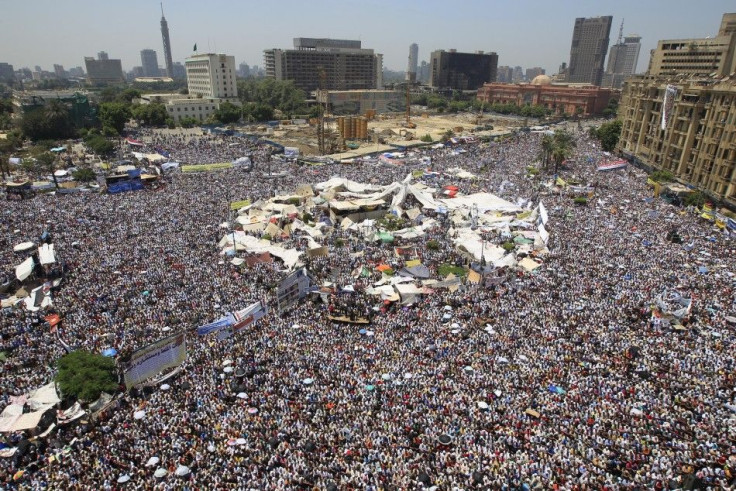Egyptian Economy, Battered From Months of Political Unrest, On Brink of Crisis

The Egyptian economy, battered after months of uncertainty and violence that has followed the political upheaval in that country, is hovering dangerously close to crisis status.
The local equities market is going into a year-end nose dive, as an exodus of foreign investors and economy-boosting tourists continues. The threat of substantial currency depreciation and inflation has economists there worried, and a recent poll by Reuters found that group expected GDP growth of about 3.1 percent in the next two years - well short of the 6 percent growth needed to keep up with the natural increases in the labor force.
As if another blow was needed, credit rating agency Moody's delivered one on Thursday, downgrading the country's sovereign debt credit rating deeper into junk status.
The economic situation is worse than anyone can imagine, Kamal El-Ganzouri, the third interim prime minister to lead the country since dictator Hosni Mubarak was deposed, said in a tearful news conference Dec. 11.
At the heart of Egypt's economic problems: street violence and political uncertainty, which played out in various protests against the temporary military government this week, is chilling investments and affecting consumer confidence. The country's stock market benchmark is down 29.7 percent on the year, with more than a third of the decline coming since the beginning of this month.
I think at the moment the biggest hindrance to investment is a lack of clarity about the transition and worries about security. I suppose they are waiting to see if [...] the elected government will try to nationalize the private sector, Mona Said, an economics professor at the American University in Cairo, was quoted as saying in an Egyptian newspaper
Foreign capital is very [fearful] as they say, they want to steer away from a lack of clarity now, Said added.
Indeed, in the press release announcing its downgrade, Moody's noted that the main driver of today's one-notch downgrade of Egypt's sovereign bond ratings is the continued unsettled political conditions.
But that is only one side of the coin: as economic activity has plummeted, the current government has been forced to draw down on its foreign currency reserves to keep imports flowing. These have dwindled to $20 billion - an amount experts say could run out in three months - from $36 billion at the beginning of the year. Foreign aid commitments of $35 billion have not been met.
Nothing has arrived, Prime Minister El-Ganzouri said in a televised conference Thursday. (Approximately $1 billion in aid has been disbursed by other Arab nations so far.)
'We've Bottomed Out'
The negative oulook, however, is not shared by all experts on the Egyptian economy.
My sense is that we're are at the bottom. There is no way but to reach up again, Hassan Aly, Professor of Middle Eastern Economics at Ohio State University told the International Business Times.
Aly, who was in Alexandria when an early-spring revolutionary fervor toppled Egypt's long-time dictator, and has spent most of the year shuttling between Egypt and Tunisia, said he believed Egypt's economy will benefit greatly from the promised foreign aid, which the government is more likely to aggressively pursue now
The fact that they have already put it in public is... pressure to deliver that aid, he explained.
The government will also likely now accept a multi-billion dollar loan from the International Monetary Fund, something the sovereign nation rejected doing in June. Egyptians have a conflicted history with the IMF, which provided aid to the country in the 1990s but forced unpopular austerity and market liberalization measures on the country.
They declined it because of the bad taste but I think they will have no other choice but to renegotiate this kind of loan, Aly stated, adding that people have started to realize they've come to a situation where declining this loan is something they cannot afford. They're in between a rock and a hard place.
Aly was also optimistic about the country's political future. While noting, as other experts have, that the major event that would help the economy is basically the political stability, he noted the high level of participation in recent parliamentary elections as a very encouraging sign.
Once we have a parliament there, there is a promise of stability, Aly noted.
From my perspective, I think we've bottomed out, he concluded
© Copyright IBTimes 2025. All rights reserved.





















